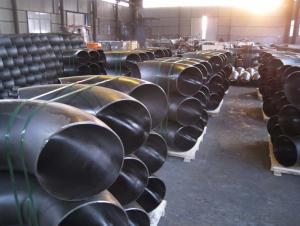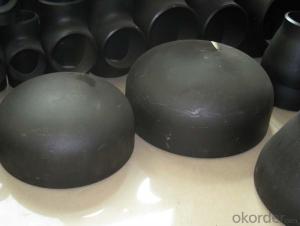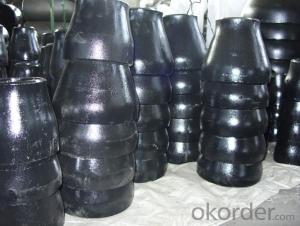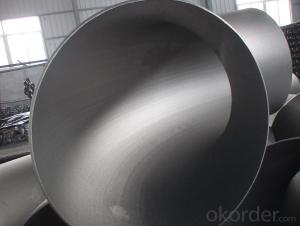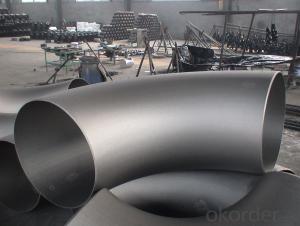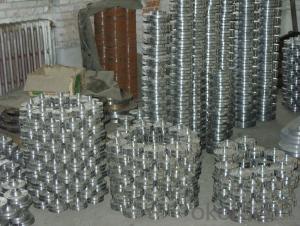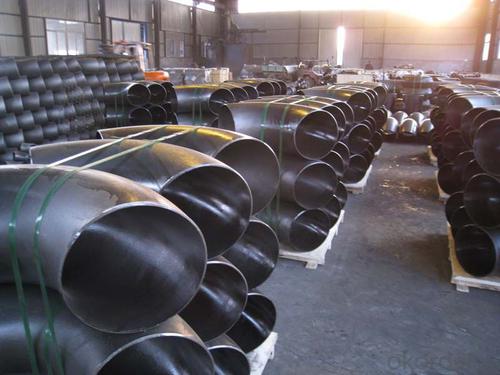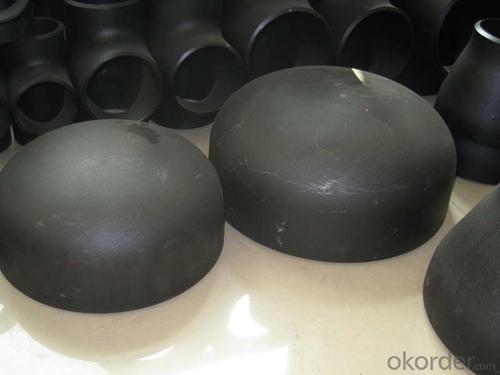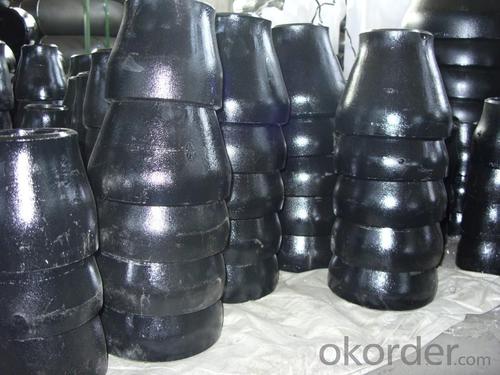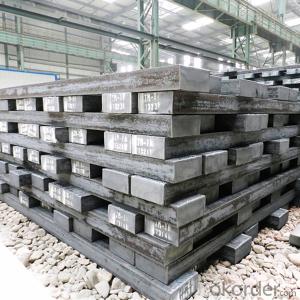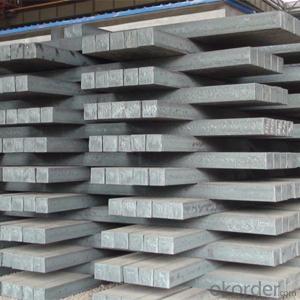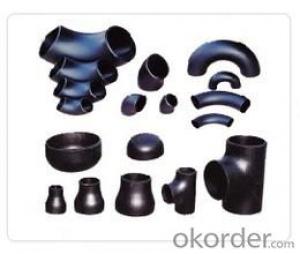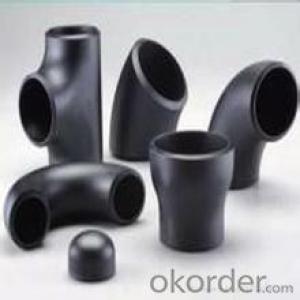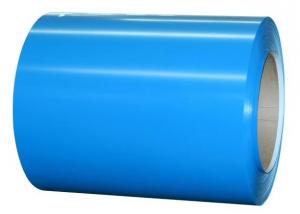CARBON STEEL PIPE FITTING BEND 90DEG
- Loading Port:
- China Main Port
- Payment Terms:
- TT OR LC
- Min Order Qty:
- -
- Supply Capability:
- -
OKorder Service Pledge
OKorder Financial Service
You Might Also Like
Specifications
pipe fitting elbow
Certificate:ISO:9001-2000
New material,completely meet asme and din standard
Best price
1. type: AISI ASTM A234 WPB BW Con Elbow
2. Size: 1/2"-48"(1/2"-24"is seamless and 26"-48"is welded)
3. Wall thickness: sch10-160, STD, XS, XXS
4. Material: A234WPB, A420WPL6, A420WP5, WP11, WP12, WP22, etc
5. Welding line: seamless
6. Angle of bend: 30, 45, 90, 180degree
7. Bending radius: SR, LR
8. Standard: ANSI B16.9, JIS, SB, DIN, GB
9. Surface treatment: black paint, vanis paint, black rust-proof oil,
transparent oil, hot galvanizing
10. Application: petroleum, electricity, chemical, natural gas, metallurgy,construction,
shipbuilding and other fields because of its high pressure, high temperature, etc
11. connection: welding
12. technics:forged
13.Certificate:ISO9001 - 2000, CE, SGS, etc.
14. packaging: wooden case, pallet, container or in accordance with the
requirement of customers
15. Principle: quality fist, customer first, credit first
16. payment: L/C T/T
17. delivery time: 7-25 days after payments
18. Notes: the bevel can be made in accordance with the special requirements
of the customers
19. Others: we can also produce the products according to the requirements
of the customers
The main production:
1. PIPE FITTINGS: elbows, tees, bends, reducers, cap, flanges and sockets etc.
2. PIPE: bult welded pipes, seamless pipes, threaded pipes, etc.
We sincerely welcom customers at home and abroad to visit us and seek common development.
- Q: What are the applications of steel forgings in aerospace?
- Steel forgings have several applications in aerospace due to their superior strength, durability, and ability to withstand extreme conditions. They are commonly used for critical components such as landing gear, engine parts, and wing attachments. Steel forgings provide the necessary strength-to-weight ratio required for high-performance aircraft, ensuring safety and reliability. Additionally, their exceptional resistance to fatigue and corrosion makes them ideal for withstanding the harsh environments encountered in aviation.
- Q: How is steel used in the production of wind turbine towers?
- Steel is used in the production of wind turbine towers due to its high strength and durability. It provides the necessary structural support for the tall towers, allowing them to withstand the forces exerted by wind and the weight of the turbine components. The steel is typically shaped and welded into sections, which are then stacked and bolted together to form the tower. This ensures stability and enables the turbine to reach greater heights, maximizing its exposure to wind and increasing energy production.
- Q: What are the different types of steel reinforcement meshes?
- There are several different types of steel reinforcement meshes used in construction, including welded wire mesh, expanded metal mesh, and ribbed or deformed steel bars.
- Q: What are the different types of steel wire and cables available?
- There are several different types of steel wire and cables available, including galvanized steel wire, stainless steel wire, carbon steel wire, and alloy steel wire. Galvanized steel wire is coated with a layer of zinc to protect it from corrosion. Stainless steel wire is highly resistant to corrosion and is commonly used in applications where strength and durability are required. Carbon steel wire is a versatile and commonly used type of steel wire with various applications. Alloy steel wire is made by adding other elements to improve its strength and other properties, making it suitable for specialized applications.
- Q: What are the advantages of using steel in the manufacturing of security doors and windows?
- The advantages of using steel in the manufacturing of security doors and windows include its high strength, durability, and resistance to forced entry. Steel is a robust material that can withstand harsh weather conditions and physical attacks, offering enhanced protection against burglaries and break-ins. Additionally, steel doors and windows provide excellent fire resistance properties, making them a reliable choice for ensuring the safety and security of homes and commercial buildings.
- Q: What are the different types of steel valves?
- There are several types of steel valves, including gate valves, globe valves, ball valves, check valves, butterfly valves, and needle valves. Each type has its own unique design and functionality, catering to specific applications and industries.
- Q: How do steel products contribute to the agriculture and farming sector?
- Steel products contribute to the agriculture and farming sector in several ways. Firstly, steel is used in the manufacturing of machinery and equipment essential for agricultural activities, such as tractors, combines, plows, and irrigation systems. These machines help increase efficiency, reduce labor, and improve productivity on farms. Additionally, steel structures, such as barns, silos, and storage facilities, provide durable and secure spaces for storing crops, livestock, and equipment. Steel is known for its strength, durability, and resistance to weather conditions, making it ideal for protecting agricultural resources. Furthermore, steel is used in the construction of infrastructure such as bridges and roads, which play a crucial role in connecting farms to markets and facilitating the transportation of goods. This infrastructure ensures that agricultural products can reach consumers in a timely and efficient manner. Overall, steel products contribute significantly to the agriculture and farming sector by enhancing productivity, providing storage solutions, and supporting the necessary infrastructure for the smooth functioning of the industry.
- Q: How is steel tubing used in the production of bicycle frames?
- Steel tubing is used in the production of bicycle frames as it provides strength, durability, and flexibility. The tubing is shaped and welded together to create the frame's main structure, providing support and stability while riding. Steel tubing allows for the construction of lightweight frames that can withstand the various forces experienced during cycling, making it a popular choice for bicycle manufacturers.
- Q: What are the different types of steel forgings and their uses?
- There are several types of steel forgings, including carbon steel forgings, alloy steel forgings, and stainless steel forgings. Carbon steel forgings are commonly used in applications where strength and durability are important, such as in automotive and construction industries. Alloy steel forgings offer enhanced properties like increased strength, heat resistance, and corrosion resistance, making them suitable for aerospace and defense applications. Stainless steel forgings are highly resistant to corrosion and are used in various industries, including food processing, medical equipment, and marine applications.
- Q: What are the different grades of steel and their applications?
- There are several different grades of steel, each with its own unique properties and applications. Some common grades include carbon steel, stainless steel, and alloy steel. Carbon steel is the most commonly used grade and is suitable for a wide range of applications, including construction, automotive manufacturing, and general engineering. Stainless steel is known for its corrosion resistance and is often used in the production of kitchen utensils, medical equipment, and architectural structures. Alloy steel, on the other hand, is a combination of different elements to enhance its strength, hardness, and durability, making it ideal for applications such as aerospace, oil and gas, and automotive components.
Send your message to us
CARBON STEEL PIPE FITTING BEND 90DEG
- Loading Port:
- China Main Port
- Payment Terms:
- TT OR LC
- Min Order Qty:
- -
- Supply Capability:
- -
OKorder Service Pledge
OKorder Financial Service
Similar products
Hot products
Hot Searches
Related keywords
